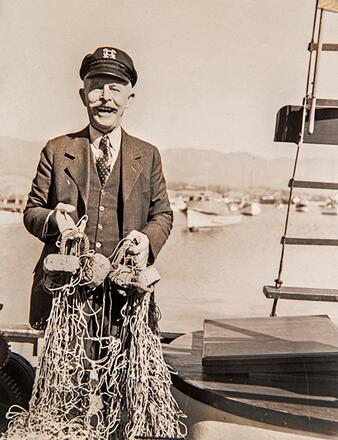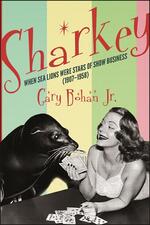
Telling the Whole Story
Guest Post by Gary Bohan Jr. (SUNY Press Author)
While writing Sharkey: When Sea Lions Were Stars of Show Business (1907–1958), about the last obstacle I expected to encounter was a moral dilemma regarding self-censorship. After all, detailing the career of the greatest performing sea lion in show business history should be a fun, lighthearted stroll, filled with entertainment and laughs. That is, until I researched how Sharkey came to be united with his trainer—my great-grandfather, Mark Huling.
Sharkey wasn’t a rescue. He wasn’t found injured on a beach and caringly nurtured to health. He wasn’t a sociable harbor sea lion befriended by someone who adopted him as a pet. No, in fact, Sharkey was captured from the wild; removed from his natural habitat off the coast of California by a man named Captain George McGuire. McGuire routinely caught wild sea lions and sold them for profit to trainers, zoos, and aquariums. At the risk of stating the obvious, that’s not such a good look in 2022.
Therein was my moral dilemma regarding self-censorship: whether to include or exclude the capturing of Sharkey in my book. To make matters more intriguing, my research uncovered a stockpile of information regarding Sharkey’s capture. I had obtained corroborating articles that detailed McGuire’s seafaring trip during which he secured Sharkey and five other top prospects. I knew the name of McGuire’s boat. I had pictures. I even had dialogue spoken between McGuire’s two assistants—a narrative nonfiction writer’s dream. I had all of this quality source material that seemed imperative to use. But still, I wondered if including it in the book would subject me to criticisms of glorifying (or at least tacitly condoning) a practice that is deemed objectionable by today’s standards.
Well, as the title of this essay implies, I decided to tell the story of Captain McGuire in my book. So, here’s a little background about the man whose business slogan was “I Supply the World with Sea Lions.” McGuire pioneered special nets and netting techniques that didn’t harm the animals versus the horrific approach used by his predecessors of clubbing them unconscious, hoping most would awaken onshore. As it turns out, McGuire was a cheerful, gentle soul who often bonded with the sea lions he netted. He named one “El Capitan,” saying he was one of the most intelligent, good-natured sea lions he had ever seen, admitting he had serious doubts about being able to part with him. McGuire gained a worldwide reputation as an expert talent scout, someone who supplied only the best specimens. Trainers valued McGuire’s judgement because he knew precisely the type of animals they desired. His sea lion operation thrived for decades. Indeed, McGuire was eighty-five years old when he netted Sharkey!
Back to my moral dilemma: Does McGuire’s development of more humane netting techniques make him a hero? Does the fact that he made a living capturing wild animals for profit make him a villain? The answer is a matter of personal perspective, I suppose. But to lionize or vilify to the exclusion of the other is, of course, not the only option.
The doings of Captain George McGuire are a reminder, to me anyway, that history is not always necessarily black and white. History, at times, can obviously be a more nuanced shade of gray. And recounting and reflecting on “historical grays” perhaps has something valuable to teach us when examining the past. That said, I have no illusions that some readers of my book might find the storyline of McGuire offensive, and I’m okay with that. Because if you’re going to be a historian and biographer—even if the subject matter is a trained sea lion—it's better, in my view, to not only tell a story, but to tell the whole story.
(Image of Captain George McGuire at age eighty-five shared with permission from the Santa Cruz Island Foundation)
Gary Bohan Jr. hails from Kingston, New York, where Sharkey was trained and is the great-grandson of Sharkey's trainer, Mark Huling. Mr. Bohan also plays trumpet and has performed with the Klezmer Conservatory Band, Joel Grey, and Itzhak Perlman.



